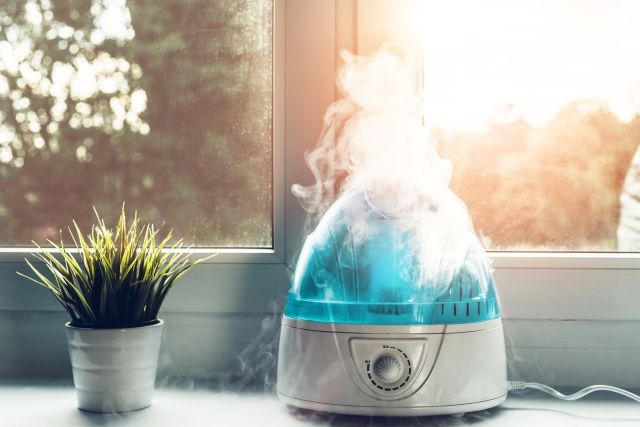Updated on October 11, 2024.
Sweater weather may bring cool breezes, crisp air, and the annual advent of pumpkin everything—but it’s also the season of dry sinuses, chapped lips, and other irritating symptoms.
The fact is, cold air doesn’t hold as much moisture as warm air, which is one reason your lips, nasal passages, and skin tend to dry out when temperatures drop. Adding water vapor to the air in your home environment, however, can help ease this seasonal discomfort.
Symptoms of other health issues that tend to flare up when the air gets colder or dry, such as dry eye or eczema, can also be improved when there is more moisture in the air. Using a humidifier could help—as long as you’re using it wisely.
Keep in mind that making the air in your home too humid can backfire, breeding potentially harmful mold and bacteria. Knowing how and when to use a humidifier correctly can help ensure that you find the right balance and get some relief.
How a humidifier could help
Anyone who experiences issues in the nose and upper airway that result from exposure to dry air might benefit from using a humidifier, explains Brietta Forbes, MD, a pulmonary disease specialist in Overland Park, Kansas. “If you have symptoms such as chronic nasal congestion, bloody nose, dry cough, or chest congestion, a humidifier could help,” advises Dr. Forbes.
As its name implies, a humidifier is a machine that simply adds moisture to the air in your home. “That moisture can promote better function of the cilia,” Forbes says. These hair-like structures in the lining of the respiratory tract help remove debris and mucus from the airway, she explains.
By moistening the dry air that can irritate your airways, humidifiers can help ease the following health issues.
Nasal congestion
Low humidity could increase survival of the flu virus and its ability to infect people—not only outdoors but indoors. And while a humidifier won’t help treat a cold or flu, a more humid environment could make it easier for some people to cough up or blow out bothersome mucus that has accumulated in their airways. That mucus could result from either a cold or other viral illness or a bacterial infection.
Excess mucus could also be triggered by exposure to allergens in the environment, Forbes says. Even during winter, indoor allergens, including dust, mold and pet dander, can trigger allergy flare-ups.
Runny nose
“It may seem counterintuitive to add moisture to help fix a runny nose, but in certain settings, increasing the water content in the airways can help you more effectively clear the nasal passages,” Forbes notes.
Nosebleeds
The nose is lined with blood vessels that help warm and humidify the air you breathe in. But dry air or constant nose-blowing and rubbing can cause the nasal passages to become crusted and cracked, and to bleed. Using a humidifier can help protect the nasal passages and prevent nosebleeds.
Dry, itchy skin
When the air is colder and dry, your skin can also become dry, flaky, and itchy. In more severe cases, skin can become cracked and start bleeding. One skin condition in particular, called eczema, can also worsen when very dry air and indoor heaters take moisture from the skin. A humidifier could help you find some relief.
Dry eye
Millions of adults in the United States are affected by dry eye. Colder temperatures and windy, dry weather can lead to the condition. So can older age, wearing contact lenses, and having certain medical conditions or nutritional deficiencies. Using a humidifier is one way to help ease red, burning, scratchy, or dry eyes.
When not to use a humidifier
On the flip side, too much moisture in the air can be risky, promoting the growth of mold and bacteria. This can have harmful health effects, particularly for those who have allergies and weakened immune systems.
Moist environments, which are breeding ground for germs, can lead to problems including infections and allergies. Dust mites—microscopic, insect-like pests that may trigger allergic reactions and asthma—also thrive in humid environments, absorbing moisture from the air. That’s why there’s a chance that a humidifier could actually cause some of the same problems they’re intended to help with, Forbes cautions.
“If the humidity is set too high on the machine, this can make respiratory or allergic symptoms worse,” she says.
If you have allergies or asthma, it’s a good idea to talk with your healthcare provider (HCP) before using a humidifier to discuss the potential risks and benefits.
People with compromised immune systems should also check with their HCP before using a humidifier, as they’re at increased risk for infection. These include people who have undergone certain cancer treatments, are infected with HIV, or have undergone a transplant surgery.
Using a humidifier safely
If you decide to use a humidifier in your home or personal space, it’s important to take precautions to prevent infections and reduce certain health risks.
- Use a cool-mist humidifier. This is particularly important if the machine is being placed inside a child’s room. Close contact with warm mist models can cause burns.
- Keep the humidity level between 30 and 50 percent. Check the humidity level in the room with a hygrometer and be sure to set the machine at these levels.
- Change the water daily. Bacteria can grow in standing water. You should replace the water in your humidifier every day. First, unplug the machine. Then empty its tank, dry the inside surfaces, and refill the tank with clean water.
- Only use pure or distilled water. Avoid using tap water, which contains minerals that can be released into the air and cause breathing problems. These minerals, which may promote bacterial growth, can also damage the machine itself.
- Clean the machine (with a disinfectant) every 3 to 5 days. Be sure to unplug your humidifier. Next, use hydrogen peroxide or the disinfectant recommended by the machine’s manufacturer to clean the tank and any parts of the machine that water passes through.
- Change the filter regularly. If your machine has a filter, follow the manufacturers’ instructions on how frequently to change it.
- Keep a safe distance. If using a humidifier in a bedroom, position the machine several feet from the bed.
- Avoid running a humidifier for prolonged periods of time. If the surfaces of the room are constantly wet or damp, it may promote the growth of mold and mildew.
During warmer months or when you know you won’t be using your humidifier for an extended period of time, remember to store it carefully. If it’s used and maintained properly, it can last several years. First, unplug it and discard any remaining water in the tank. Then, clean and dry the machine as directed and remove and discard the filter. Finally, return the humidifier to its original box and store it in a cool, dry place.







